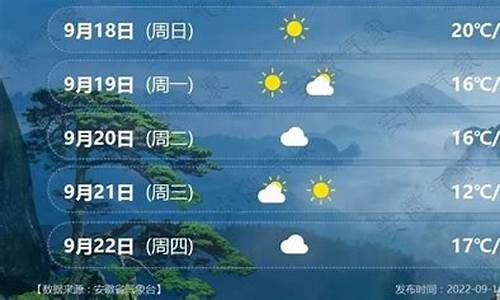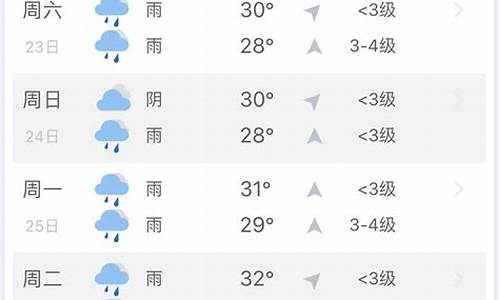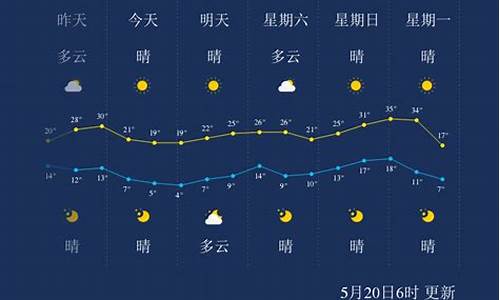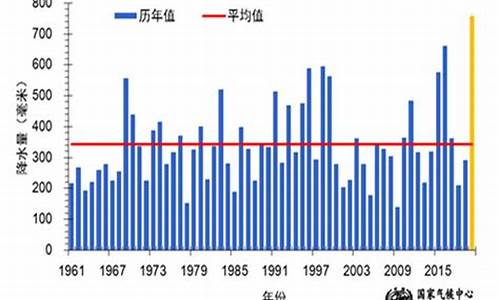天气前加不加介词_天气前加the吗
1.weather和if的用法?
2.英语问题
3.英语有关天气的语法
4.一年四季前用哪个介词?
5.为什么这句英语对话中tomorrow和here都加了介词? tomorrow 和 here 前加介词和不加2介词区别?
6.How is the weather today? 能加like么
weather和if的用法?

Whether和if的区别与联系
首先,你把"whether” 写成了"weather"(天气),这是很要不得的.
一、if或whether引导宾语从句时,作“是否”讲,常放在动词ask 、see 、say 、know和find out等后面.一般情况下,两者常可换用,在口语中多用if.
二、if或whether引导宾语从句时,要注意三个方面,即连词、语序和时态.
1、 if或whether不能和that 或其它连词(副词)同时使用,也不能省去.
2、if或whether引导的宾语从句时,虽具有疑问意义,但从句语序应用陈述句语序.
3、 if或whether引导的宾语从句应和主句的时态保持一致.即主句为一般现在时,从句用任一种时态;主句为一般过去时,从句则用过去时中的任一种时态.
三、if和whether的区别:
1、 在动词不定式之前只能用whether .
2、 在whether …… or not 的固定搭配中,不用if…… or not.
3、 在介词后,只能用whether.
4、宾语从句放在句首表示强调时,只能用whether .
5、用if会引起歧义时,只用whether.如:
Could you tell me if you know the answer
这句话有两种意思:“你能告诉我是否知道答案吗?”或“如果你知道答案,请告诉我,好吗?”.如用whether可避免歧义.
希望以上回答可以帮到你.
英语问题
The weather is hotter than __that of____ yesterday
答案是选 1.that of
因为比较的是今天的天气和昨天的天气,所以要用that 来代替the weather.
yesterday 是时间,本身是副词,不要加其它的介词in, at. on等等。
yesterday在这里是作名词用的,
昨天的天气,yesterday's weather或者the weather of yesterday.
than 后面的that所指代的 weather,是属于昨天的weather,可以用所有格形式来表示。
所以就是that of yesterday.
答案是选 1.that of
不选2,是因为前半句没有出现it指代天气,而是用来weather.
如果要选2.it was的话,前半句应该是It is hotter,
就成了It is hotter (today省略了)than it was yesterday. 所以选2就不对啦。
宝贝把这个学明白了,以后的本领就更大啦!
英语有关天气的语法
什么叫“关于天气的英语语法”总结啊?是时态吧,语法还有形容词、名词等
造几个句子,应该是这样吧!
一般现在时:现在雨下得很大。It is raining hard now。
一般过去时:昨天下了雨:It was raining hard yesterday.
一般将来时:According to the weather report,there will be a heavy rain tomorrow.
过去将来时:According to yesterday's weather report,there would be a heavy rain.
只要把各种时态的结构搞清楚,自己造句不是难事,关于天气的语法就会搞清楚了。
三个表达,三层不同的正确性和意思,并不相同。
1. What's the weather like?
What 代词,作后面介词like的宾语。
is 系动词
the weather 主语
like 介词,介词+代词作表语。
这句问的是天气的特点,比如是热带还是寒带,冬暖夏凉、潮湿、还是寒冷干燥。
2. How's the weather?
How 副词,作表语。
is 系动词
the weather 主语
这句问的是天气的状态,比如是在下雨还是晴天,是冷还是热。
3. How's the weather like?
这句的语法是错的。How在这个语境里只能是副词,like只能是介词,而副词是无法作介词的宾语的。只不过,美国人到处都用这个句型,应该是把what讹成how了。这可能也算约定俗成吧?这句话的意思应该更接近What's the weather like?如:
How's the weather like in Houston? 休斯顿的天气怎么样?
一年四季前用哪个介词?
用in
介词in, on, at在表示时间时的用法区别
①in时间范围大(一天以上)如:in Tanuary, in winter, in 1999;泛指在上午,下午,晚上,如:in the morning(afternoon, evening).
习惯用法:in the daytime 在白天。
②on指在某一天或某一天的上午,下午,晚上,如:on Monday, on Sunday afternoon, on July 1, 1999
③at时间最短,一般表示点时间,如at six o’clock, at three thirty.习惯用法:at night, at noon, at this time of year.
in, on和at在表达时间方面的区别
in 表示在某年、某季节、某月、某周、某天和某段时间
in a year在一年中
in spring 在春季
in September 在九月
in a week 在一周中
in the morning/afternoon/evening 在上午/下午/傍晚
但在中午,在夜晚则用at noon/night
on 表示某一天或某一天的某段时间
on Monday 在周一
on Monday afternoon 在周一下午
on March 7th 在3月7日
on March 7th, 1998. 在1998年3月7日
on the morning of March 7th, 1998. 在1998年3月7日上午
at 表示某个具体时刻。
at eight o’clock 在8点钟
at this time of the year 在一年中的这个时候
at the moment 在那一时刻
at that time 在那时
注意:在英语中,如果时间名词前用this, last, next 等修饰时,像这样的表示,“在某时”的时间短语前,并不需要任何介词。
例如:last month, last week, this year, this week, next year, the next day, the next year等。
1.What’s the weather like in spring/summer/autumn/winter in your country?
你们国家春天/夏天/秋天/冬天的天气怎么样?
in 在年、月、周较长时间内?in a week 在里面?
in the room
用某种语言?in English 穿着
in red
on 某日、某日的上下午on Sunday afternoon 在……上面?
on the desk 靠吃……为生live on rice 关于?a book on Physics
〔误〕 We got to the top of the mountain in daybreak.?
〔正〕 We got to the top of the mountain at day break.?
〔析〕 at用于具体时刻之前,如:sunrise, midday, noon, sunset, midnight, night。
〔误〕 Don't sleep at daytime?
〔正〕 Don't sleep in daytime.?
〔析〕 in 要用于较长的一段时间之内,如:in the morning / afternoon, 或 in the week / month / year. 或 in spring / supper /autumn / winter等等。?
〔误〕 We visited the old man in Sunday afternoon.?
〔正〕 We visited the old man on Sunday afternoon.?
〔析〕 in the morning, in the afternoon 如果在这两个短语中加入任何修饰词其前面的介词都要改为on, 如:on a cold morning, on the morning of July 14th?
〔误〕 He became a writter at his twenties?
〔正〕 He became a writter in his twenties?
〔析〕 这句话应译为:他在20多岁时就成了作家。在某人的一段生活时间段中要用介词in来表示,而在具体岁数时用at来表示。?
〔误〕 He went to New York to find a job in sixteen years old.?
〔正〕 He went to New York to find a job at sixteen.?
〔析〕 在具体年岁前用at, 如:at the age of 12, at your age, 等等。?
〔误〕 We went to swim in the river in a very hot day.?
〔正〕 We went to swim in the river on a very hot day.?
〔析〕 具体某一天要用介词on, 又如:on New Year's Day?
〔误〕 I'm looking forward to seeing you on Christmas.?
〔正〕 I'm looking for ward to seeing you at Christmas.?
〔析〕 在节日的当天用on,而全部节日期间用at,Christmas是圣诞节期间,一般要有两周或更长的时间。?
〔误〕 I haven't see you during the summer holidays.?
〔正〕 I haven't seen you since the beginning of the summer holidays.?
〔析〕 during表示在某一段时间之内,所以一般不与完成时搭配,如:I visited a lot of museums during the holiday. 而for表示一段时间,可以用于完成时,如:I haven't see you for a long time. 而through 用来表示时间时则为"整整,全部的时间"。如:It rained through the night.?而since则是表达主句动作的起始时间,一般要与完成时连用。?
〔误〕 At entering the classroom, I heard the good news.?
〔正〕 On entering the classroom, I heard the good news.?
〔析〕 On 加动名词表示"一……就"。本句的译文应是:我一进入教室就听见这个好消息了。又如:on hearing… 一听见, on arrival 一到达就……(on表示动作的名词)?
〔误〕 In the beginning of the book, there are some interesting stories.?
〔正〕 At the beginning of the book, there are some interesting stories.?
〔析〕 at the begining与at the end都是指某事物的开始与结束部分,均不指时间范围,而in the beginning 则是指开始一段时间。in the end=at last是指"最终,终于"之意。?
〔误〕 Till the end of next week. I will have finished this work.?
〔正〕 By the end of next week. I will have finished this work.?
〔析〕 by 引起的时间状语表示了动作的截止点,其意思为"不迟于某一时刻将工作做完",所以主句一般是完成时态。当然可以有将来时态,如:I'll be there by five o'clock.而till则表达其一动作一直持续到某一时刻,但句中的动词一定要用持续性动词,而瞬间的截止性动词应用其否定句式,如:I won't finish this work till(until) next weekend.?
〔误〕 He came to London before last weekend.?
〔正〕 He had come to London before last weekend.?
〔正〕 He came to London two weeks ago.?
〔析〕 before 一般要与完成时连用,而ago则与一般过去时连用。?
〔误〕 I have studied English for three years gince I had come here.?
〔正〕 I have studied English for three years since I came here.?
〔析〕 since用来表达主句动作的开始时间,所以其引出的从句中应为过去时,而不能用完成时态
〔误〕 I can help you repair this bike. You will get it after two hours.?
〔正〕 I can help you repair this bike. You will get it in two hours.?
〔析〕 中文经常讲两小时之后来取,两天内会修好,而这个介词在英文中要用in而不要用after。其原因有二,①after 多用于过去时,如:I arrived in New York. After three days, I found a job in the bank. ② after 加时间是表达一个不确定的时间范围,如:after three days, 即三天之后的哪一天都可以。所以在许诺若干时间内会完成某事时,一定要用介词in。?
〔误〕 Three days after he died.?
〔正〕 After three days he died.?
〔正〕 Three days later he died.?
〔析〕 after 与 later都可以用来表达一段时间之后,但它们所处的位置不同,after 在时间词前,而later在时间词后。?
〔误〕 She hid herself after the tree.?
〔正〕 She hid herself behind the tree.?
〔析〕 after多用来表达某动作之后,所以有的语法书中称它为动态介词,如:I run after him. After finishing my homework, I went to see a film. 而behind则多用于静态事物之后。?
〔误〕 There is a beautiful bird on the tree.?
〔正〕 There is a beautiful bird in the tree.?
〔析〕 树上长出的果实,树叶要用on, 而其他外来的人、物体均要用in the tree.?
〔误〕 Shanghai is on the east of China.?
〔正〕 Shanghai is in the east of China.?
〔析〕 在表达地理位置时有3个介词:in, on, to。 in表示在某范围之内; on表示与某地区接壤;to则表示不相接。如:Japan is to the east of China. ?
〔误〕 I arrived at New York on July 2nd.?
〔正〕 I arrived in New York on July 2nd.?
〔析〕 at用来表达较小的地方,而in用来表达较大的地方。at常用于at the school gate, at home, at a bus stop, at the station, at the cinema, at a small village。?
〔误〕 He lived in No. 3 Beijing Road.?
〔正〕 He lived at No. 3 Beijing Road.?
〔析〕 在门牌号码前要用at, 并要注意它的惯用法:at the end of the street, at the foot of the mountain, at the top of the page。?
〔误〕 There is a colour TV set at the corner of the hall.?
〔正〕 There is a colour TV set in the corner of the hall.?
〔析〕 在屋内的角落应用in,而墙的外角用at,如:There is a tree at the corner of the street.?
〔误〕 This weekend I'll stay in Uncle Wang's.?
〔正〕 This weekend I'll stay at Uncle Wang's.?
〔析〕 要注意英文的特殊表达法,如:at a tailor's shop (裁缝店)=at a tailor's, ?at the doctor's (去看病) at the bookseller's (在书店) at uncle Wang's (在王叔叔家)
〔误〕 Do you know there is some good news on today's newspaper?
〔正〕 Do you know there is some good news in today's newspaper?
〔析〕 在报纸上的新闻要用in, 而在具体某一版上,或某一页上则要用on。?
〔误〕 The school will begin on September 1st.?
〔正〕 School will begin on September 1st.?
〔析〕 这里的school应看作不可数名词泛指学校的课程,即开学之意。要注意,有些活动场所当表达正在从事该种活动时不要加冠词,如:at table (吃饭), When I came to Tom's home, they were at table. 还有: at desk (学习),at work (工作) at school (上学), in hospital (住医院) at church 作礼拜?如加上定冠词则另有他意,如:at the school 即在学校工作或办事,in the hospital 即在医院工作或去看望病人。?
〔误〕 In my way to the station, I bought a newspaper to kill time.?
〔正〕 On my way to the station, I bought a newspaper to kill time.?
〔析〕 译文为:在去车站的路上我买了份报纸,为的是消磨时光?"在……的路上"应用on one's way…。而 in the way 有挡道之意,如:Please move the chair it is in the way。
为什么这句英语对话中tomorrow和here都加了介词? tomorrow 和 here 前加介词和不加2介词区别?
在这个对话中,"tomorrow"和"here"都加了介词,是因为它们都需要与其他单词结合在一起才能形成完整的句子,并表达正确的含义。具体来说:
"What's the weather forecast for tomorrow?"这个句子中,"for"是介词,用于引导表示时间段的名词"tomorrow",表示在未来的某个时间点(即明天)的天气预报。
"It's freezing in here."这个句子中,"in"是介词,用于表示地点,指的是说话人所在的这个地方(即"here")很冷。
因此,这两个介词在这个对话中都是必要的,用于在句子中指定时间或地点,并确保句子表达的意思更加明确和清晰。
需要注意的是,介词是英语中非常常见的一类词汇,用于表示时间、地点、方向、原因、目的等等。在英语中,有些动词、形容词或名词需要搭配介词来表达特定的意思,因此在句子中使用介词是非常普遍和必要的。有时候,介词的选择也会受到语境的影响,不同的场合或情境可能需要使用不同的介词,以表达正确的意思。因此,学习和掌握英语介词的使用是学习英语语言的一个重要方面。
除了常见的介词如"for"、"in"、"on"、"at"等,还有一些复杂的介词短语,例如"according to"、"in spite
of"、"instead
of"等等,这些介词短语也是英语中经常使用的,需要在学习英语时进行掌握。在使用介词时,还需要注意一些特殊情况,例如有些动词既可以直接跟宾语,也可以搭配介词来表达不同的意思;有些介词具有多种含义,需要根据上下文来确定具体意思等等。因此,学习和理解英语中介词的使用是学好英语的重要一步。
How is the weather today? 能加like么
What's the whether like today?
like是做介词,在这里what是作为名词,how是一个副词。名词才需要用到介词,副词不需要。
或者如果你还是不明白,可以从意思上来理解。
what's the whether like today?和How's the whether today?其实都是今天的天气怎样的意思。
可是为了让你好理解,你可以这样翻译:
what's the whether like today?今天的天气像什么?像就是like,什么就是what.所以what能like并用很容易解释。可是你有见过人家:今天的天气像怎样?意思是like不会跟怎样(即how)连接。
声明:本站所有文章资源内容,如无特殊说明或标注,均为采集网络资源。如若本站内容侵犯了原著者的合法权益,可联系本站删除。












